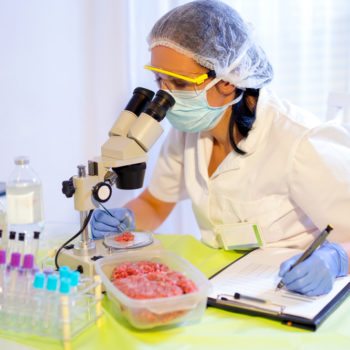Why We Love It
-
$93,390Potential Avg. Salary
-
8.2%Job Growth Rate
-
Growing DemandJob Outlook
-
Good Entry Level SalaryCareer Attribute
Biochemists conduct research on the chemical processes of living things like people, plants, and animals. They use the findings of their research to benefit society in a number of ways. They may develop life-saving drugs, discover new ways to solve crimes, or find ways to increase food production on farms.
Recommended Schools
What is a Biochemist?
The following job responsibilities are common for individuals in biochemist roles:
- Conduct experiments and research studies on how different chemicals interact with cells and the other building blocks of life forms
- Come up with ways to isolate molecules like DNA, fats, and proteins
- Apply research findings to solve real-world problems like hunger, disease, or crime
- Present and distribute findings to the greater scientific community so that others can build upon findings with subsequent research
- Manage laboratories, clean equipment, and safely store dangerous chemicals
A Day in the Life
Biochemists conduct research on cells, DNA, proteins, fats and other components of living things like humans, plants, and animals. Some biochemists conduct basic research that’s designed to increase our general knowledge of how living things work, reproduce, and are composed. For example, biochemists may discover new molecules that exist in the body, such as DNA. These biochemists present the world with new findings about human, animal, and plant life and how life is sustained across organisms.
Other biochemists work in applied research and study how different chemicals and processes affect cells and molecules. For example, a biochemist may conduct experiments to determine how different chemical processes affect cancerous cells. In doing so, he/she may be able to find a cure for cancer. Applied researchers also work in agriculture, finding new ways to promote food growth to end hunger. Biochemists may also form ways of isolating DNA to be used in solving crimes by forensic scientists.
While biochemists spend the majority of their time conducting research and experiments, they’re also responsible for reporting their findings to other scientists. For example, they may compose research papers and submit their writing to scientific journals for publication, or they may present their findings at industry conferences. This allows other scientists and researchers to build on the new findings of a biochemist so that the scientific community at large can work together to advance society.
Typical Work Schedule
In general, biochemists work full-time during normal business hours. Overtime or evening work may occasionally be required to meet deadlines or complete time-sensitive experiments.
Projected Job Growth
Demand for biochemists is expected to grow in the coming decade in order to support research initiatives for new disease treatments and pharmaceuticals. As healthcare becomes more available to the population at large, more biochemists will be needed to discover improved treatments for illnesses and diseases.
Typical Employers
Most biochemists work for research facilities, but many also work for universities with research departments, for pharmaceutical companies, or in manufacturing.
Recommended Schools
How To Become a Biochemist
To become a biochemist, you’ll need to have a Ph.D. To earn a Ph.D., you’ll need to work your way up through college to qualify for enrollment in applicable Ph.D. programs. The first step is earning a bachelor’s degree. Bachelor’s degrees in biochemistry are uncommon, so many aspiring biochemists major in subjects like biology, physics, or chemistry. It’s important for undergraduate students to take courses in both math and the sciences to be best prepared for the research and analysis required of biochemists.
The next step is to earn a master’s degree. When choosing a master’s degree program, students have more of an opportunity to focus on biochemistry as a specialization. Master’s degrees in biochemistry, molecular biology, biomedical sciences, and biochemical engineering are commonly sought by aspiring biochemists. After earning a master’s degree, you may be able to find work in the field assisting professional biochemists, but to conduct research independently, you’ll need a Ph.D.
When choosing a Ph.D. program, students should focus on applying for programs dedicated to the field of biochemistry they’re interested in working in. For example, biochemists who want to work in pharmaceuticals should focus coursework on biochemistry related to the study and treatment of illness and disease. With a Ph.D. in biochemistry, aspiring biochemists can take on postdoctoral roles in research positions that allow them to begin their careers as biochemists doing basic or applied research.
Biochemist Salary Data
We’ve provided you the following to learn more about this career. The salary and growth data on this page comes from recently published Bureau of Labor Statistics data while the recommendations and editorial content are based on our research.
National Anual Salary
Low Range
$58,620Average
$93,390High Range
$153,810National Hourly Wage
Low Range
$28/hrAverage
$45/hrHigh Range
$74/hrHow do Biochemist salaries stack up to other jobs across the country? Based on the latest jobs data nationwide, Biochemist's can make an average annual salary of $93,390, or $45 per hour. On the lower end, they can make $58,620 or $28 per hour, perhaps when just starting out or based on the state you live in.
Salary Rankings And Facts
#84 Nationally for All Careers
Above Average Salary Nationally
Programs and Degrees
Here are the most common degrees for becoming a Biochemist. a is usually recommended and specifically a degree or coursework that prepares you for the particular field, see below.
Highest Education Among Biochemists
- 19.6% Doctorate
- 32% Masters
- 43.8% Bachelors
- 2.2% Associates
- 2.1% College
- 0.2% High School
- 0.1% Less than High School
Job Growth Projections and Forecast
2014 Total Jobs
34,1002024 Est. Jobs
36,900Job Growth Rate
8.2%Est. New Jobs
2,800How does Biochemist job growth stack up to other jobs across the country? By 2024, there will be a change of 2,800 jobs for a total of 36,900 people employed in the career nationwide. This is a 8.2% change in growth over the next ten years, giving the career a growth rate nationwide of Above Average.
Growth Rankings And Facts
#272 Nationally for All Careers
Above Avg. Growth Nationally
What Companies Employ The Most Biochemists
| Industry | Current Jobs | New Jobs Needed | % Increase |
|---|---|---|---|
| Research and development in the physical, engineering, and life sciences | 16,100 | 2,100 | 2% |
| Pharmaceutical and medicine manufacturing | 4,600 | --- | --- |
| Colleges, universities, and professional schools; state | 4,000 | 200 | 0% |
















